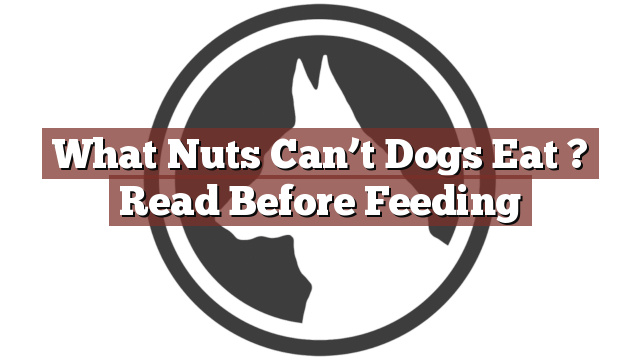Understanding Your Dog’s Dietary Needs
As responsible pet owners, it is crucial to understand that dogs have different dietary needs compared to humans. While we may enjoy a variety of foods, not all of them are safe for our furry friends. Dogs have specific digestive systems that may not be able to tolerate certain foods, including nuts. It is essential to be aware of what nuts dogs cannot eat to ensure their health and well-being.
What Nuts Can’t Dogs Eat? Read Before Feeding
Can dogs eat nuts? This is a common question that many dog owners ask. The answer is not as straightforward as a simple "yes" or "no." While some nuts are safe for dogs to eat in moderation, others can be toxic and potentially dangerous to their health. It is crucial to avoid feeding your dog certain nuts that can cause severe health issues.
One of the most dangerous nuts for dogs is the macadamia nut. They contain a toxin that can lead to symptoms like weakness, vomiting, tremors, and hyperthermia in dogs. Even a small amount of macadamia nuts can be harmful, so it is best to keep them away from your furry friend. Similarly, walnuts and hickory nuts should be avoided as well. These nuts can cause gastrointestinal upset and potentially lead to pancreatitis in dogs.
Pros and Cons of Feeding Nuts to Dogs
While there are some nuts that dogs should not eat, there are a few varieties that can be safely consumed in moderation. For example, peanuts, when unsalted and unseasoned, can be given to dogs as an occasional treat. Peanuts are a good source of protein, healthy fats, and vitamins for dogs. However, it is crucial to be mindful of the portion size and not overfeed them.
Another nut that can be fed to dogs in moderation is the almond. Almonds are rich in healthy fats and can provide some nutritional benefits to dogs. However, it is important to note that almonds should always be given in small quantities, as they can be difficult for dogs to digest. Furthermore, it is essential to avoid feeding dogs flavored almonds, as they often contain harmful additives like salt or sugar.
Conclusion
In conclusion, it is important to be cautious when it comes to feeding nuts to dogs. While some nuts can provide nutritional benefits, others can be toxic and potentially harmful to their health. Macadamia nuts, walnuts, and hickory nuts should always be avoided, as they can cause severe symptoms and gastrointestinal upset. Peanuts and almonds, when given in moderation and in their natural form, can be a safe treat for dogs. However, it is always best to consult with your veterinarian before introducing any new food into your dog’s diet to ensure their well-being and safety.
Thank you for taking the time to read through our exploration of [page_title]. As every dog lover knows, our furry friends have unique dietary needs and responses, often varying from one canine to another. This is why it's paramount to approach any changes in their diet with caution and knowledge.
Before introducing any new treats or making alterations to your dog's diet based on our insights, it's crucial to consult with a veterinarian about [page_title]. Their expertise ensures that the choices you make are well-suited to your particular pet's health and well-being.
Even seemingly harmless foods can sometimes lead to allergic reactions or digestive issues, which is why monitoring your dog after introducing any new food item is essential.
The content provided here on [page_title] is crafted with care, thorough research, and a genuine love for dogs. Nevertheless, it serves as a general guideline and should not be considered a substitute for professional veterinary advice.
Always prioritize the expert insights of your veterinarian, and remember that the health and happiness of your furry companion come first.
May your journey with your pet continue to be filled with joy, love, and safe culinary adventures. Happy reading, and even happier snacking for your canine friend!

